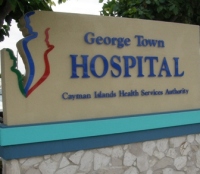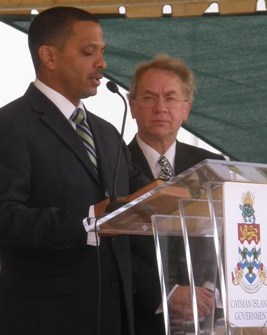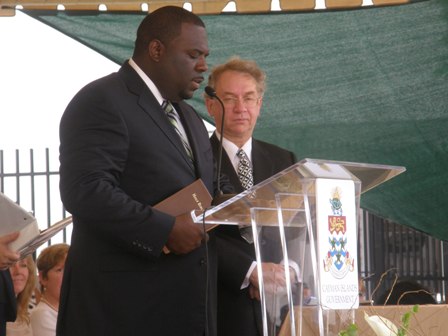Archive for July 25th, 2009

Swine flu claimed life
 (CNS):Health officials have confirmed this evening that a 31-year-old male resident of Caribbean Haven has died of swine flu. Although a test for Influenza A had proved negative, it has now been confirmed by the Cayman Islands Hospital that the CAREC lab’s H1N1 test has returned positive, and while the man has a pre-existing medical condition, the flu virus was the cause of his death. The man went to the hospital on Saturday 18 July and died on Monday.
(CNS):Health officials have confirmed this evening that a 31-year-old male resident of Caribbean Haven has died of swine flu. Although a test for Influenza A had proved negative, it has now been confirmed by the Cayman Islands Hospital that the CAREC lab’s H1N1 test has returned positive, and while the man has a pre-existing medical condition, the flu virus was the cause of his death. The man went to the hospital on Saturday 18 July and died on Monday.
Minster for Health Mark Scotland said that officials, who have been in contact withthe family from the start, have met with them and shared this information and offered his condolences.
“We all hoped that no one in Cayman would be severely affected by H1N1. But this unfortunate death shows that as a country we face the same challenges in managing this illness as do other countries around the world,” he said. “Sadly, it is a fact that persons with underlying medical conditions, such as the young man who passed away, are susceptible to serious complications, and sometimes death.”
He added that the Medical Officer of Health Dr Kiran Kumar and his team had visited Caribbean Haven immediately following the resident’s death in order to counsel residents and staff.
“They also tested those who had flu symptoms, and offered them the drug Tamiflu as treatment. As a preventative measure, Tamiflu was also offered to staff and residents who did not have flu symptoms,” the minister said. “Health officials will provide further details on H1N1 in Cayman at a press briefing on Monday.”
He said that government does have adequate supplies of Tamiflu and asked people to do their part by remaining calm and following public health advisories. “It is very important that we understand that H1N1, as well as seasonal flu, are national health issues. We all have important roles in preventing their spread,” Scotland added.
Meanwhile, a public health team has also visited West Bay as a result of fears of a flu outbreak in a local neighborhood. “We met with residents to inform and reassure them after three residents of the National Housing Trust (NHT) affordable housing development in Captain Jose Osborne Drive were hospitalized with the flu,” said Dr Kumar. Of the three patients, one was scheduled to go home on Friday, 24 July.
“We discussed the nature of the H1N1 virus, how to prevent the spread of it, and how to care for those who get sick,” Dr Kumar said, adding that the fears were understandable, especially in light of recent events and the rise in the number of hospitalisations.
“We will continue to educate the public, and anyone with concerns should call the Public Health Department. It is important that people have the correct information so they can be full partners in the effort to contain the H1N1 virus,” said Dr Kumar.
He explained that those in high risk groups are people who, when they do get the flu, have a higher probability of getting severely ill. It does not mean that they are at higher risk of catching the virus. In fact, according to the CDC’s statistics, the highest rates of infection are in those under 25, and the median age of hospitalized cases in the US is 19 years old. High risk groups include children under the age of five, adults over the age of 65, pregnant women, people with weakened immune systems, and people with chronic conditions, such as asthma, diabetes, and heart disease. If you are in a high risk group it means you have to monitor your illness and seek medical attention if your symptoms are severe.

Tourist dies while swimming at Rum Point
(CNS): The Royal Cayman Islands Police Service said this evening that it had begun an investigation following the death of a 71-year-old man who was visiting the Cayman Islands. Police stated hat the 911 Emergency Communications Centre received a call today (Friday 24 July) at 11:13am reporting that a man, who had been swimming at Rum Point, was unresponsive. Police and medics responded and the man was taken to hospital where he was subsequently pronounced dead.
The victim who had been visiting Grand Cayman with his family was from the United States. The RCIPS sends its condolences to family and friends of the victim.
Anyone with information about crime taking place in the Cayman Islands should contact their local police station or Crime Stoppers on 800-8477 (TIPS). All persons calling Crime Stoppers remain anonymous and are eligible for a reward of up to $1000 should their information lead to an arrest or recovery of property/drugs.

Lawyers battle over challenge
 (CNS): The legal battle over the legitimacy of the election challenge to two Bodden Town MLAs began in Grand Court this morning (Friday 24 July) before Chief Justice Anthony Smellie, who heard intense legal arguments from both counsels. Lord Pannick, QC, representing the defence, put the case that the only way an election challenge could be brought against Members of the Legislative Assembly is through an Election Petition, while Gerard Clarke argued that the plaintiffs’ case rests on the Constitution and the issue of qualification, which could not be confined by the Election Law.
(CNS): The legal battle over the legitimacy of the election challenge to two Bodden Town MLAs began in Grand Court this morning (Friday 24 July) before Chief Justice Anthony Smellie, who heard intense legal arguments from both counsels. Lord Pannick, QC, representing the defence, put the case that the only way an election challenge could be brought against Members of the Legislative Assembly is through an Election Petition, while Gerard Clarke argued that the plaintiffs’ case rests on the Constitution and the issue of qualification, which could not be confined by the Election Law.
The arguments played out in front of a crowded court room, which included a strong show of force by the United Democratic Party government members, including Leader of Government Business McKeeva Bush, and party supporters. Both of the challenged MLAs, Minister Mark Scotland (pictured above) and back bench MLA Dwayne Seymour (below) were present at the defence table.
 Following the chief justice’s explanation that the proceedings were being held in open court because of the obvious public interest, Lord Pannick opened for the defence with the argument that the Grand Court had no jurisdiction because any challenge to the validity of the defendants’ election could only be brought via an Election Petition and the plaintiffs had not done so.
Following the chief justice’s explanation that the proceedings were being held in open court because of the obvious public interest, Lord Pannick opened for the defence with the argument that the Grand Court had no jurisdiction because any challenge to the validity of the defendants’ election could only be brought via an Election Petition and the plaintiffs had not done so.
By filing an Originating Summons instead of a Petition, he said the plaintiffs were abusing the process and were seeking to by-pass the obligation in a petition to file the challenge in a specific way. He explained that the plaintiffs would have had to file within 21 days (an irony not lost on those involved) of an election, publicly display the grounds of the challenge and provide financial security to the court.
Lord Pannick added that while the challenge was a constitutional one, the Constitution itself had provided the means by which any challenge could be brought through its provisions for an enactment of the Election Law. In short, he argued that the Legislative Assembly had passed the law to provide remedy for any challenge and that included ones regarding qualification. He noted that should anyone be allowed to bring a challenge outside of those provisions, which included safeguards of the public interest through issues of expediency and fairness, the Election Law itself would be made redundant and “would frustrate the intentions of the Constitution.”
Lord Pannick noted that, since the UK courts took jurisdiction of election challenges in 1868 and because of the sensitive nature, no such challenges have succeeded through any other means but by petition. He noted too that the need to be certain who is elected to the legislature is of such public importance, the speed of dealing with challenges was paramount, and hence the strict process by which they can be made has been adhered to by the courts.
He insisted that there simply was no other route for the plaintiffs to seek remedy but by petition, and as they had failed to do that the court must strike out the summons.
By contrast, however, Clarke made the argument that in the Cayman Islands the Election Law was not defined as the exclusive route for an election challenge. He said that in this case the plaintiffs were bringing a challenge which dealt purely with the defendants’ right to qualification for the election and not the election itself, which is what the local Election Law was concerned with. He said the law did not have the power to limit the right to apply to the court conferred by the Constitution.
Clarke argued that the Constitution was wider than the Election Law, which did not cover all questions concerning elections. He added that the language wasdifferent and that the Election Law was concerned with the election process and not qualification of candidates. He compared the issue to a race in which the question was not whether the runners had cheated but the fact that they were not qualified to be on the starting line in the first place. “The Elections Law Petition addresses the race but not who is entitled to enter the race,” he said, adding that it was the Constitution itself that was concerned with qualification.
Addressing the accusation that the plaintiffs were seeking to avoid the obligations of the petition, Clarke said the plaintiffs were making a stand on the constitution and the choice of remedy for the challenge was deliberate. He said the Election Petition was not the exclusive route and that the difference in language between the Election Law and the Constitution was important and relevant.
He noted that his learned friend’s argument would suggest that the Election Law trumped the Constitution, which he said would be indeed surprising given that the Constitution is a higher law. Clarke argued that the Election Law was designed with precise limits for good reasons, but if it had been crafted to be a comprehensive code it would have indicated clearly that it was the only and exclusive route to challenges — something he said the law did not do.
Clarke pressed the point that if an MLA was found to be disqualified after the time limit of a petition, a challenge still had to be allowed and that would be through the courts. Therefore, there was no reason that the remedy the plaintiffs had chosen was not legitimate just because the disqualification was raised before the election.
He denied the Originating Summons was an abuse of process and said the Election Petition was simply not an appropriate route for this particular challenge. Clarke stated that the issue surrounding the MLAs in question was “constitutional nullity” not cheating in the election. Therefore the court did have jurisdiction to decide. He maintained that the plaintiffs’ case was all about qualification under the Constitution, and that an Election Petition was not something the plaintiffs were avoiding but something which did not offer appropriate remedy.
The proceedings drew to a close around 4:00 in the afternoon as the two legal teams conclude their argument and the chief justice announced he would adjourn to consider his ruling on the matter.
The challenge was made by six voters from the district of Bodden Town who claimed that Seymour and Scotland were not qualified to be elected as they failed to gazette the details of government contracts held by their respective companies before the dealine laid down under Section 19 (1) (g) of the 1972 Cayman Islands Constitution.
If the chief justice does not strike out the summons, the legal teams will move to further legal battle to establish the legitmacy or not of the two Bodden Town MLAs’ election to office, which could result in a by-election in the district.